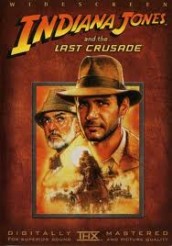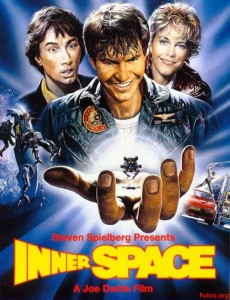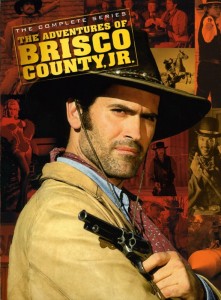This article originally appeared in EON MAGAZINE on February 11, 2000. The interview with Jeffrey Boam was conducted in 1996
For some, the death of screenwriter Jeffrey Boam two weeks ago at age 53 proved to be but a footnote in many publications. Screenwriters rarely receive the credit they deserve, and, because of that, are often overlooked and remain in the shadows of the stars and directors whose names are usually plastered above the main title.
Of course, for genre fans, Jeffrey Boam, whose death was attributed to a rare lung ailment, was one of today’s best screenwriters. From INNERSPACE to INDIANA JONES AND THE LAST CRUSADE, Boam knew how to combine action, humor and characters into an exciting package. Even his comic book adaptation of THE PHANTOM in 1996 was quintessential Boam – and if you chose to ignore Billy Zane’s silly purple costume, you would have found at its heart a solid retro-adventure very much akin to the Indiana Jones universe.
One of the pleasures of writing about the genre is getting the opportunity to talk with these unsung genre heroes at length. Back in 1996, I spent a very enjoyable two hours talking with Boam about his writing technique, breaking into the business and his unique career.
In tribute, EON offers excerpts from this interview – most of which appears in print for the very first time.
*********
Growing up in Northern California, Jeffrey Boam was oblivious to Hollywood but always felt the impact of the cinema.
“One of the first movies I fell in love with was TOM JONES,” he recalled. “To me, it was a movie filled with the joy of life. It was hard to get scripts in 1964, but I sent away for it in New York, and when I got it I was surprised how brief the scenes and dialogue where. I remember the movie being so dense and the scenes filled with so much dialogue that when I read the script there was barely a speech no more than two lines. I learned that that dialogue is usually brief exchanges not speeches, and I learned that simply by looking at the page of the screenplay and not seeing big blocks of dialogue even though that’s how I perceived the movie to be.”
While Boam had a fascination with the written word, he initially started off as an art student “leading me to think that somehow how I could use my art talents to get into the movie business.”
His skills leaned toward storyboard artist or designing posters, but when he picked up a UCLA catalogue, he noticed they actually had a film department.
“I applied and once I got there I thought I would study directing but it proved to be pretty costly because you had to pay for your own film, processing and rental equipment,” said Boam. “I didn’t have the money to do that so I took a writing course because I had the money to buy paper and I already had a typewriter. That’s how I got into the writing field.”
Breaking into the business came pretty easy for Boam as well, after writing a couple of spec scripts.
“My writing teacher called me out of the blue one day and said ‘I know a producer who is looking for scripts from young writers and I thought you might have something’,” said Boam, who said a couple of his scripts were shown to the producer who saw potential in his work.
“He liked them a lot but it wasn’t really what he was looking for,” added Boam. “He did say it showed a lot of talent and that his girlfriend was just starting out as an agent and was looking for clients. I told him that ‘I’m looking for an agent,’ so we got together, and I was her first client and she was my first agent and I immediately got jobs.”
Ironically enough, Boam admitted that he never had a first big sale: “I never sold a script, much to my disappointment.”
“I never had any scripts on the market actually,” he added. “The only two scripts I ever wrote that could be sold were the first two that got me my first writing job. From that point on, I’ve been working on assignment. That’s been good. It’s kept me employed, but it’s also kept me out of the spec screenplay market pretty much.”
One of Boam’s first major genre assignments was adapting Stephen King’s THE DEAD ZONE for Lorimar and working for SINGIN’ IN THE RAIN director Stanley Donen long before David Cronenberg became attached.
“Stanley was interested in making a movie that would connect with contemporary youthful audiences, and at the time Stephen King was it because every one was making Stephen King movies,” he recalled. “I think Stanley would have done a great job, but the script we developed together is very close to the script that David wound up making.”
When Donen left the project, it fell apart at Lorimar and Dino De Laurentiis purchased the rights with Debra Hill coming aboard as producer.
“Two years after I stopped working with Stanley, I got a call from Debra saying ‘We want to make THE DEAD ZONE, and we want to use your script,’” recalled Boam. “So I spent a week with David and Debra reshaping the script I had done with Stanley.”
The reason Cronenberg himself didn’t pen the screenplay — having scripted every other film he directed prior to that — was simple according to Boam: “David is a good writer, but he is a very quirky writer and couldn’t write something as mainstream as THE DEAD ZONE.”
“When you start calling THE DEAD ZONE mainstream, then it shows you how out there Cronenberg is,” laughed Boam. “David read the script that I wrote, and I think the script helped him decide to make the movie.”
In the summer of 1987, Boam had two big genre efforts released – INNERSPACE and THE LOST BOYS, which he was writing both at the same time.
“THE LOST BOYS, I felt, had a movie hidden under a lot of unsuccessful writing, and we were unearthing it,” said Boam. “I worked with another director on that too – Richard Franklin [PSYCHO II, ROAD GAMES, PATRICK] and we developed a much more straighter movie than the one that was ultimately made. “When Joel Schumacher came aboard, he had a real vision for the look of the movie and the first thing he said is ‘E.T.–take this out of the suburbs.’ Originally it was a movie that took place like E.T. or POLTERGEIST in suburbia and he wanted to get rid of that completely, which he did.”
As for INNERSPACE, Boam had felt the initial script didn’t seem to hold up well.
“The idea was kind of ridiculous, which was a person miniaturized and put into someone else’s body,” said Boam. “That’s all I kept from the original script. They originally thought it might be Michael J. Fox inside Arnold Schwarzenegger’s body. I actually kept turning it down, and they were persistent and kept coming back to me.”
Under contract at the time to Warner Bros., Boam realized that the studio wasn’t making the movies he wanted to write, so he decided to write a movie they wanted to make. The experience of writing INNERSPACE liberated his imagination.
“It was such a goofy idea that there were no limits to it,” he said. “I felt I could do anything, and so the script I wrote was very loony and far out there but everybody loved it. Dick Donner, Joe Dante, John Carpenter and even Steven Spielberg wanted to do it. So when Steven wanted to do it, Warner’s thought I was a God and any amount of money it would take to do the movie they would spend. Steve ultimately decided he only wanted to produce so Joe came along and really latched on to the idea.”
An assignment for LETHAL WEAPON 2 followed, working for director Richard Donner which proved to be quite grueling.
“You do a lot of changes on the LETHAL WEAPON movies because Donner is very spontaneous and always wants something new the day he shoots the scene,” recalled Boam. “He’ll call me up around seven in the morning saying ‘We’re about to shoot this scene, I have this idea, what do you think? Can you fax it to me?’ So we were constantly altering the script as we went along.”
Shortly after LETHAL, Steven Spielberg called with the Holy Grail of writing gigs (so to speak).
“I forget what he said, but it was something like, ‘You wanna get real rich?’ and I said ‘Yeah, why?’ and he said, ‘I think you should do the next Indiana Jones movie’,” recalled Boam. “He said he had to talk to George because George didn’t know me from Adam. So a long time went by, and I actually put it out of my mind. Then Steven called me for some other reason, and I said ‘By the way, anything going on for the Indiana Jones idea?’ and he said, ‘I think George is going to call you soon.’ So I got a call from George and he wanted to meet me at Amblin. I went over there, met with George and got along real well and the next step was spending about two weeks with George working out the story for INDIANA JONES AND THE LAST CRUSADE.”
The process proved to be very simple according to Boam. “Lucas had ideas for set pieces already in mind,” recalled Boam. “The whole thing in Venice with motorboards and the two hulls the motorboat gets crushed between was already in his mind. And what I brought to it especially was this whole Sean Connery thing. The father character had never been evolved. This was actually Lucas’ fourth attempt to do a third INDIANA JONES movie. There were two other writers who had kind of false starts, but nobody really tackled the father relationship or the father’s character, so that gave me a lot to work with.”
At the time of this interview (1996), Boam had actually done a couple of drafts for INDY 4 but said he couldn’t really talk too much about it.
“George is very happy with the script and Steven is happy with it too, but the next step is to get Harrison on board,” Boam said at the time.
Another key project for Boam was serving as creator and co-producer on FOX’s THE ADVENTURES OF BRISCO COUNTY JR. which lasted one ill-fated season.
“That was the first TV series that made it on the air,” he said. “I had developed eight or nine shows at various networks and this was the only one to go.”
The experience proved to be very satisfying for Boam because he notes that producing the pilot was much like doing a movie. However, FOX didn’t have enough faith in the series to keep it going for another season.
“The ratings were not good, but the show had a lot of fans,” said Boam. “I think FOX somewhat believed in the show, and I think if there was an opening, they might have gone for another season.”
The last filmed project of Boam’s was THE PHANTOM in 1996, and while it followed in the shadow of other failed pulp comics brought to the big screen (THE ROCKETEER and THE SHADOW), he said working with Lee Falk’s classic character proved to be an easier challenge than anticipated.
“I stayed pretty close to the source material,” he noted. “I actually never heard of THE PHANTOM until the project was offered to me, and when I got it, I did some research and realized this comic has been going on for 60 years. It was extremely popular when it was first introduced in the ‘30s and is still popular in foreign countries. I figured if it ain’t broke, don’t fix it.”
Though Boam became known for his genre work, the film that he really enjoyed working on was the 1988 Chevy Chase comedy FUNNY FARM.
“FUNNY FARM was based on a book, and after reading it I loved it – it was exactly the kind of movie I always wanted to write,” said Boam. “It needed a lot of work because it wasn’t told in the fashion that could be filmed, but I loved the idea of working with Chevy. He was a comedy hero of mine and still is.”
The tone of the movie changed when director George Roy Hill came aboard, but Boam was pleased nonetheless.
“It was different from what I expected–George wanted to do a much classier version than I ever imagined it to be,” said Boam. “I imagined it to be a little cruder, more low-brow humor, rougher and more like the movies Chevy was doing at the time, but George was a classy guy and he wasn’t going to do that. He does what he does. He made the movie classy, and I think a lot of Chevy’s fans were let down because it wasn’t as raucous and vulgar as they might have expected.”
Ironically enough, Boam originally thought he would use screenwriting to eventually segue into directing, yet aside from helming the TALES FROM THE CRYPT episode “Creep Course,” he soon found that writing was where his true love remained.
“Writing basically became such a challenge and a goal that directing became secondary,” he said. “[Doing that episode] made me want to stop directing, actually. It was so jarring to go from the life as a writer to being a director, even though it was only a four-week commitment, that I didn’t really enjoy it.
“I didn’t like the fact that I had to do it all day long and that the job required me to get up, go to work, come home and go to bed,” he recalled. “It was too labor intensive. I enjoy doing other things during the day other than working and I missed the freedom to do what I wanted to do. I didn’t like to devote my every waking hour to pursue one single thing which is what a director does. I really have no interest in doing that again. I’m happy being a writer.”
Boam is survived by his wife of 24 years and three children (two daughters and one son) and his devotion to his family and being there for them was one of the main reasons he preferred the life of a writer, since it allowed him to be at home. It also helped with other aspects of life as well.
“It’s worked out great — I never have to worry about not being here when the cable man shows up,” laughed Boam. “This is a great luxury in life.”
EON’s wishes go out to Boam’s family. His talent and good-nature will certainly be missed.
©1996, 2000, 2013 by Anthony C. Ferrante
Article Source: Assignment X
Article: Exclusive Interview: Screenwriter Jeffrey Boam
Related Posts:













